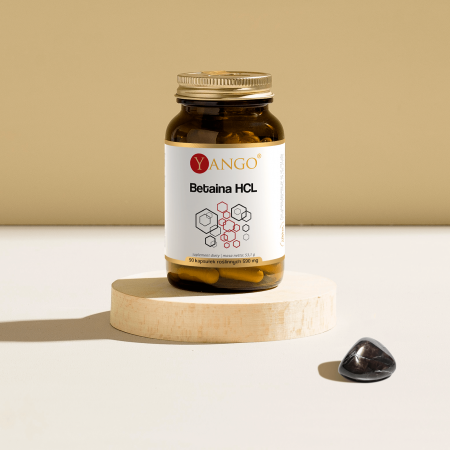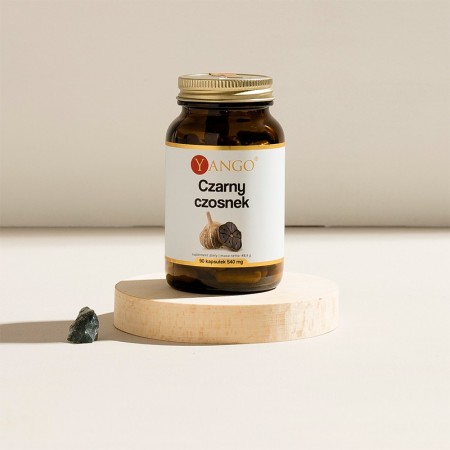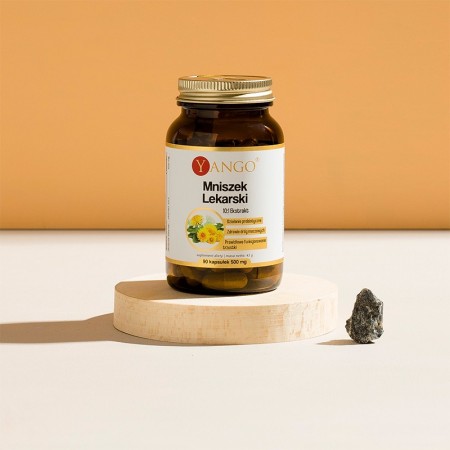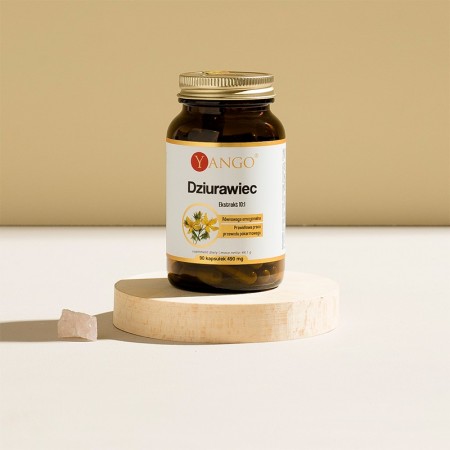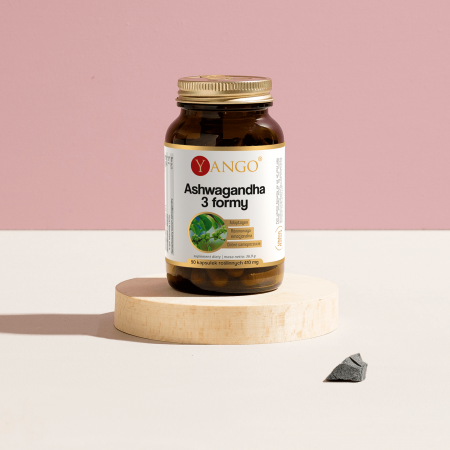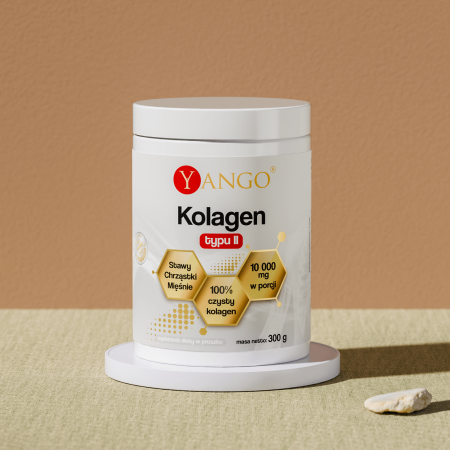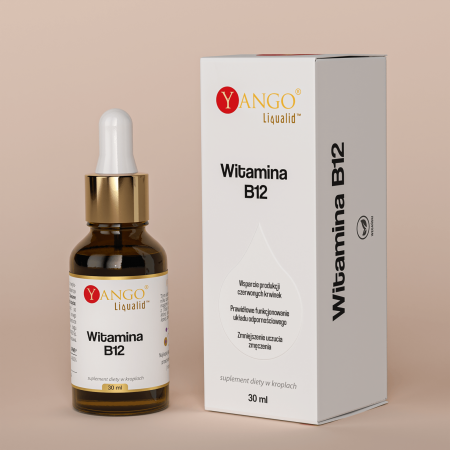Lycopene - 90 capsules.
The product comes in small and large capsules.
![]() Take care of your heart and circulatory system.
Take care of your heart and circulatory system.
![]() Protect the health of your eyes.
Protect the health of your eyes.
![]() Reduce inflammation.
Reduce inflammation.
![]() Reduce the impact of free radicals.
Reduce the impact of free radicals.
![]() Vegan product.
Vegan product.
![]() No fillers.
No fillers.
-
 Vegan
Vegan
-
 Standaryzowany
Standaryzowany
-
 Polska firma
Polska firma
Lycopene from tomatoes
Lycopene is the red pigment responsible for the distinctive color of tomatoes. It is a natural chemical compound from the carotenoid group, and has attracted the attention of scientists for years because of lycopene's potential properties.
Research suggests that lycopene may have positive effects on human health, particularly as a protective factor against certain diseases, including cardiovascular disease or eyedisease1,2,3. In addition, lycopene is an antioxidant, meaning that it can help combat the harmful effects of free radicals in the body4.
Lycopene - In which products it can be found
Lycopene occurs naturally in many fruits and vegetables, but its highest concentration can be found in tomatoes. Tomatoes are the main source of lycopene, especially in red or orange-skinned varieties. Other sources of lycopene include watermelon, pink grapefruits, papaya, guava and various varieties of pumpkin. It is important to note that lycopene is primarily present in ripe fruits and vegetables.
Interestingly, the lycopene content of animal products, such as meat and dairy, is usually low. Therefore, in order to ensure a lycopene-rich diet, we should take care primarily of plant-based products. It is also worth noting that tomato preparations, such as tomato paste, puree, passata or tomato juice, are also rich sources of lycopene. During the processing of tomatoes, the lycopene content can increase because the action of heat helps release it from plant cells.
Since lycopene is fat-soluble, to get the most out of it from food, it is recommended to consume lycopene-containing products in combination with a small amount of healthy fat, such as olive oil. Fat helps lycopene to be better absorbed by the body5.
How much lycopene is in tomatoes?
The lycopene content of tomatoes can vary depending on variety, ripeness and preparation. Mostly, however, tomatoes are considered one of the richest sources of lycopene in the diet. The approximate content in fresh tomatoes is about 3-5 mg of lycopene per 100 grams of product6.
The present preparation contains a high lycopene content - as much as 15 mg in each capsule.
Does lycopene protect the eyes?
Lycopene plays an important role in protecting eye health due to its antioxidant and anti-inflammatory properties. Its strong antioxidant activity helps fight excess free radicals in the body, which can lead to tissue damage, including the eye. In addition, lycopene is a compound that exhibits anti-inflammatory effects that can relieve inflammation in the eyes. Of particular importance is its effect on macular degeneration (AMD), one of the leading causes of vision loss in the elderly. Lycopene acts as a filter, protecting retinal cells from the harmful effects of UVA and UVB radiation, as well as bluelight7,8,9,10.
In addition, lycopene supports blood vessel health, which is important for proper blood circulation within the eyes. Although lycopene is not a miracle cure for all eye problems, regular consumption of foods rich in this compound, such as tomatoes, can contribute to overall eye health11. Remember that with any eye problems, it's always a good idea to consult an eye doctor for proper diagnosis and recommendations.
Lycopene for the heart?
Lycopene may have potential beneficial effects on heart and cardiovascular health due to its antioxidant and anti-inflammatory properties. Studies suggest that regular consumption of lycopene-containing foods may be associated with a reduced risk of certain heart diseases12.
Lycopene acts as a powerful antioxidant, fighting harmful free radicals that can damage blood vessels and lead to inflammation. Oxidative damage is one of the risk factors for heart disease, such as atherosclerosis, hypertension and coronary artery disease13. Lycopene can help reduce the risk of disease by neutralizing free radicals and protecting blood vessels from damage14.
In addition, lycopene may alleviate inflammation in the cardiovascular system due to its properties. Chronic inflammation contributes to the development of many diseases by damaging blood vessel walls and promoting the formation of atherosclerotic plaques. Lycopene improves the function of blood vessels by, among other things, reducing the inflammation that occurs inthem15,16.
In addition, there are studies suggesting that lycopene intake may be associated with a reduced risk of heart attack and stroke. However, the results of these studies still require furtherconfirmation17,18.
In order to benefit from the potential health properties of lycopene, it is recommended to consume a variety of lycopene-rich foods, such as tomatoes, watermelon, pink grapefruit and dietary supplements, as long as recommended by a doctor or nutritionist. We should also remember that lycopene is not a miracle drug, and that a healthy lifestyle, including a balanced diet, regular physical activity and avoidance of risk factors, is key to maintaining heart and cardiovascular health.
For whom is a lycopene-rich diet recommended?
A lycopene-rich diet is indicated for most people, regardless of age or gender, as part of a healthy lifestyle and disease prevention. Lycopene, being a powerful antioxidant, can help fight harmful free radicals and prevent oxidative damage that can lead to many diseases12.
A diet rich in lycopene may be particularly beneficial for people at risk for heart disease. Studies suggest that adequate levels of lycopene in the body may have an effect on lowering LDL cholesterol (the so-called "bad" cholesterol). In addition, lycopene exhibits anti-inflammatory properties and therefore reduces the risk of chronic inflammation in the cardiovascularsystem15,16.
In addition, a high intake of lycopene may be beneficial for people at risk of eye diseases such as macular degeneration (AMD) and cataracts. Lycopene acts as a filter, protecting retinal cells from harmful UV radiation and blue light, which can contribute to eye damage. Regular consumption of lycopene-rich foods, such as tomatoes and watermelon, can help maintain eyehealth7,8,9,10.
It's also worth mentioning that lycopene intake should be higher in people living in areas with high levels of environmental pollution, as lycopene may also play a protective role against harmful chemicals19.
In any case, it is important to take care of a balanced and varied diet that includes various sources of lycopene, such as tomatoes, watermelon, pink grapefruit and tomato products.
WE FOCUS ON QUALITY!
We produce YANGO supplements maintaining the highest rigors of quality control. We take care of the right concentration of active substances and total safety of the products. We believe that in this way we can effectively help you achieve your goals.

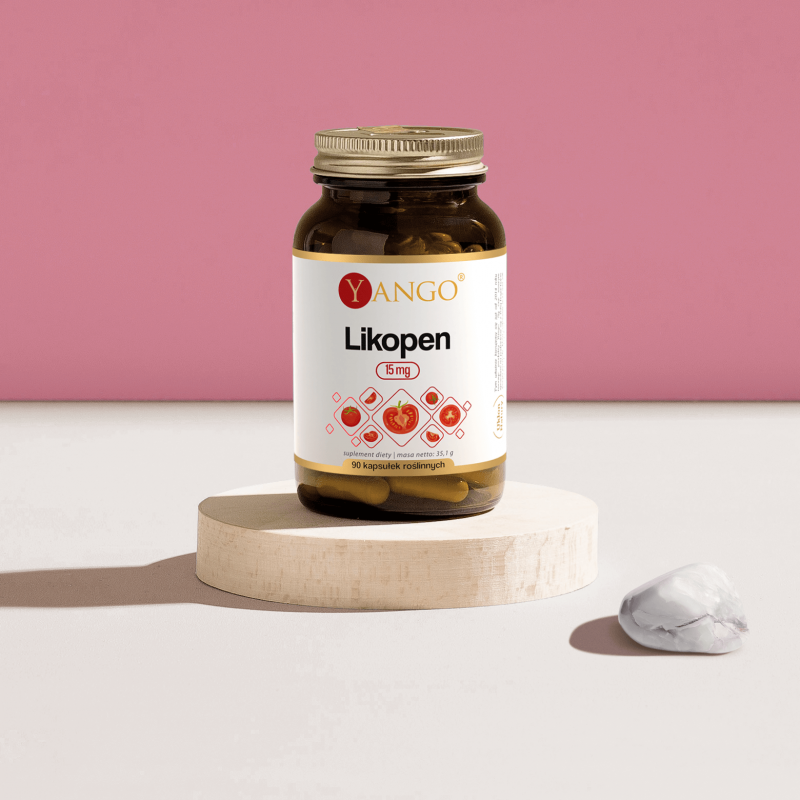


 The product comes in small and large capsules.
The product comes in small and large capsules. Take care of your heart and circulatory system.
Take care of your heart and circulatory system.